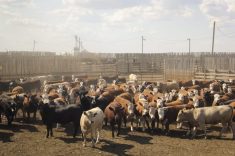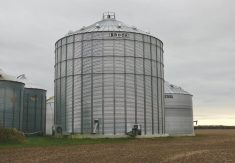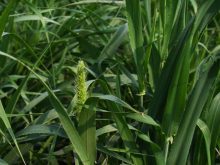An identity-preserved oilseed, highly touted in the 1990s for its possible use in low-trans-fat margarines and other foods, is about to lose its official grain status.
Canada Western Solin — a low-linolenic type of yellow flaxseed promoted under the trade name Linola — will be pulled from the federally-regulated roster of official grains of Canada on Aug. 1 next year, the Canadian Grain Commission said Wednesday.
Linola became an "official" grain in 1995 and was grown, marketed and handled under contract through United Grain Growers (which later merged into Agricore United, then into Viterra).
Read Also

U.S. grains: Soybeans continue gains on Trump’s China comments
Chicago | Reuters – Chicago Board of Trade soybeans continued a three-day rally on Friday, fuelled by President Donald Trump’s…
UGG developed Linola in a joint-venture partnership with Australia’s Commonwealth Scientific and Industrial Research Organization (CSIRO). Winnipeg-based UGG had bought the Linola development program in 1992 from Biotechnica Canada, CSIRO’s original j.v. partner.
The crop produced oil with significantly low levels of alpha-linolenic acid, an omega-3 fatty acid. Given its oil’s similarities to sunflower oil, Linola saw significant interest from growers and end-users when it was introduced in 1994.
However, Linola acreage eventually tapered off due to "increased volatility" in edible oilseed markets, Agricore United said in 2002.
AU would promote the crop again that year when sunflower oil was in short supply, urging growers to lock in prices early as it expected the crop to again provide higher profits, above those of flax or canola.
Ultimately, however, the crop "has not been in production for approximately five years, and there are no intentions of introducing it back into the market," the CGC said Wednesday.
Furthermore, the CGC said, solin seeds are visually indistinguishable from those of new yellow varieties of CW Flaxseed, which have higher levels of alpha-linolenic acid — 60 per cent or more, compared to three per cent or lower in Linola — and are grown for health food markets.
Cancelling the registration of solin will make registering new varieties of yellow flaxseed easier and faster, the CGC said, because flax breeders will then be able to follow the "regular" registration process.
Solin breeders have already formally asked that the registration of their solin varieties with the Canadian Food Inspection Agency be cancelled.
Come Aug. 1, there will no longer be a grade schedule nor quality standards for solin, nor the right for growers to request subject to inspector’s grade and dockage on any deliveries. Nor would any deliveries of solin be covered under the CGC’s payment protection program.
"There could be a few farmers in Western Canada who still have solin in their bins. If they are keeping it for delivery, they should contact Viterra as soon as possible, prior to Aug. 1," CGC chief commissioner Elwin Hermanson said Wednesday.
Any solin deliveries made after that date can’t be declared as CW Flaxseed, he said.
Listed varieties of CW Solin include CDC Gold, 1084, 2047, 2090, 2126 and 2149.














